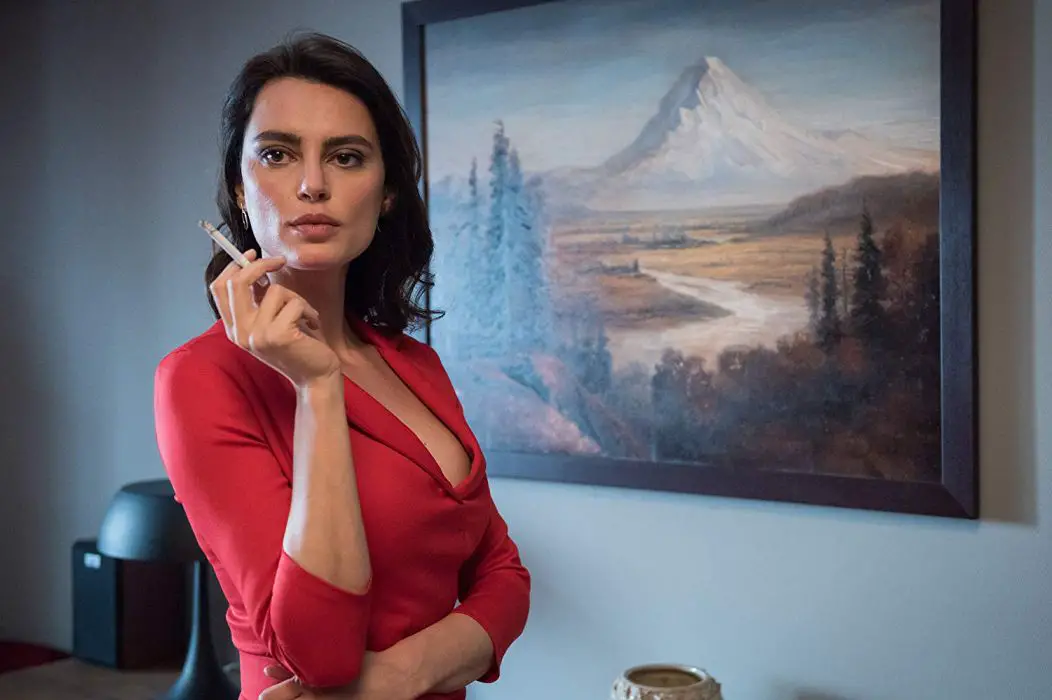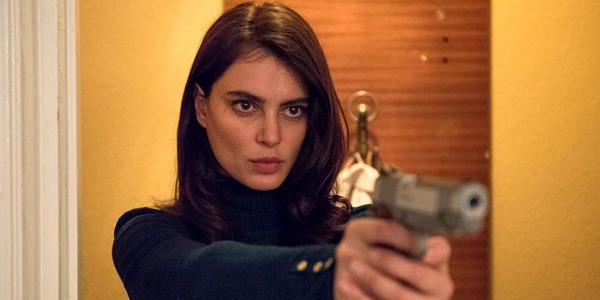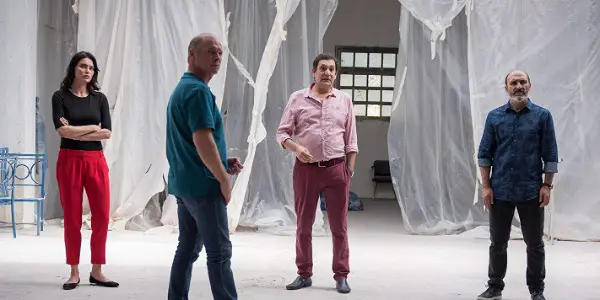THE WHISTLERS: Labyrinthine Crime Saga Is Stoic, Efficient & Strangely Poignant

I'm a student at the University of North Carolina at…
It’s difficult to describe The Whistlers. Romanian writer/director Corneliu Porumboiu, best known for post-Communism satire 12:08 East of Bucharest, creates a knotty and complex crime drama with his latest film, which premiered at last year’s Cannes and New York Film Festivals prior to its stateside release. Split into non-linear chapters and often confusing to a fault, Porumboiu‘s film is dry, methodical, and devoid of much in the way of affect or even a notable dramatic pulse. Suspense is diffused as quickly as it arrives. Violence is quick and painless. Most characters are objective-driven to the bitter end.
The Whistlers is also a film about a fundamental struggle for genuine communication, focusing on one cop’s search for connection as he traverses a complex and dangerous criminal space. In a film with double crosses, back-stabbing, and the sense of a pervasive lack of trust, the cherry on top is a whistling language that seemingly reduces communication to a series of blank, emotionless noises—all as a way of ensuring that a criminal scheme can be pulled off. Porumboiu builds a labyrinth around these ideas, allowing our seemingly doomed characters to spin themselves into a cataclysmic web.
But just as it seems as if The Whistlers will end without much in the way of conventional catharsis, Porumboiu builds to a conclusion that took me completely by surprise—even if, in retrospect, it’s an inevitable and necessary solidification of the driving themes.
Caught In a Web of Crime
Cristi (Vlad Ivanov) is the platonic ideal of a detective: calm, stoic, and quietly intelligent. He’s a man of few words, but you can see the gears turning behind his emotionless facade. But Cristi is also in well over his head, working both sides of a major criminal operation for his police force. The ruthless and morally bankrupt captain Magda (Rodica Lazar) and an equally persistent colleague (George Pistereanu) are dead-set on taking down Zsolt (Sabin Tambrea), a drug dealer and money launderer who has gained quite a reputation for himself; by chance, he happens to be one of Cristi’s main associates and connections to the underworld. Despite questions of legality and fairness, these cops are willing to go to criminal lengths to get the job done.

Unfortunately for Cristi, he’s linked with a dangerous and volatile criminal syndicate—a syndicate with a vested financial interest in making sure Zsolt gets out of prison and retrieves a large sum of money for them. Led by Paco (Agustí Villaronga), these gangsters have Cristi in their clutches, and there’s little chance of a clean escape for him at this point, especially since he already lost a rather large sum of money. There’s also Gilda (Catrinel Marlon), a beautiful and cunning woman who’s playing a complex game with Zsolt and Paco for her own personal advantage. Cristi and Gilda have a unique, uncertain relationship, and it’s eventually clear that the detective feels some kind of affection for her—he wants to make sure she gets out of the crazy mess alive.
With this tangled saga growing by the minute, Cristi is exposed: Magda knows he’s playing both sides. At this crucial juncture, two plans emerge. First, Cristi travels to the island Gomera, where he is taught a whistling language that allows communication to go undetected by the cops; this will theoretically allow the gangsters to break Zsolt out of prison without being noticed. Zsolt will then take them to their money, Paco will take care of Zsollt, and Cristi and Gilda will go home scot-free—everybody’s happy. But Cristi and Zsolt are playing their own game, teaming up with Magda to turn the tables on their bosses. The two separate narratives are destined to collide, and when they do, it won’t exactly be pretty.
Genre Film Fused With Slow Cinema
Perhaps I’ve revealed too much in this brief synopsis, but I think it’s necessary to lay a bit of groundwork for the basic plot of this film. It’s a complex, often puzzling work, reliant on a multitude of double-crosses and personal transactions that don’t always click into place on first glance; in fact, I even skimmed my screener a second time just to make sure I got the details right. To make matters even more convoluted, Porumboiu chooses to tell the story in a non-linear manner, starting with Cristi’s arrival on Gomera and frequently using the chapter structure (each major player comprises a chapter in the film) as a way of introducing flashbacks to fill in the necessary details.

There’s a thin semantic and practical line between convoluted and intricate, and The Whistlers indeed gets really close to falling on the wrong side of that line. But with Porumboiu‘s film, it’s much less about what happens than how it happens—a common platitude that actually means something in this instance. Porumboiu‘s work is frequently mentioned in the context of modern slow cinema (Ira Jaffe’s Slow Movies (Wallflower, 2014) includes 12:08 East of Bucharest in a major chapter), a categorical grouping which helps to characterize and understand his new film in a more definitive way.
More specifically, Porumboiu is working at the intersection of slow cinema and a more conventional crime story. Its art-house influences are undeniable, but to pretend that The Whistlers isn’t shaded by film noir, cop dramas, and even action/adventure cinema more generally is to avoid a large part of the film’s effectiveness. What makes the film so unusual and striking is that it takes familiar generic tropes, structurally jumbles them into a mind-numbing puzzle, and eventually removes much of the emotion or excitement that we traditionally associate with these genres.
Unexpected—And Unexpectedly Moving—Ending
The result is a film that unfolds slowly and patiently, often keeping its plot and emotional undercurrents at a distance from the viewer. If that idea seems somehow tedious or antithetical to the idea of an ambitious crime film, it actually makes much more sense in the context of the film’s protagonist. Cristi is a man who made serious mistakes in his life—even his mother (Julieta Szönyi) is worried about the man he has become. As played by Ivanov, Cristi is buried under a dozen layers of careful strategy and planning, exhibiting his emotion only through the subtle moves he makes to survive. The criminal underworld is unforgiving and violent, and Cristi is either completely numb to it or has the world’s best poker face.

But Cristi isn’t the only one who approaches this dirty business with a dispassionate, removed sensibility: it’s the common denominator for virtually every character in the film. They all have clear and unequivocal goals and objectives, and they intend to stop at nothing to fulfill them to the best of their abilities. It’s all one big game, and it concludes in a predictable, equally straightforward burst of violence.
If this description prompts anyone to raise an eyebrow, I totally understand. For much of the runtime, I found myself engaged by Porumboiu‘s filmmaking and gorgeous European settings, yet coolly detached from the flat characters or the increasingly complex narrative. But once the dust settles from the gory shootout, something strange happens: everything clicks into place. From the function of the whistling language to the general repression of emotion, Porumboiu ties it all together for an ending that’s initially tragi-comic in nature, only to slowly bleed into something much more beautiful. Removed from the criminal underworld, Cristi’s story becomes unexpectedly poignant. It culminates in a wordless finale that took my breath away, functioning both as an unexpectedly satisfying conclusion to the story and a transcendent moment of beauty and awe in its own right.
The Whistlers: Conclusion
Sure, Porumboiu lets the classical music do a lot of the heavy lifting, but that doesn’t make it any less powerful. Truth be told, my opinion of a film has rarely been changed so dramatically by its final 10 minutes. Pivoting from steely resolve to emotional profundity, the brilliant evolution in its final moments cements The Whistlers as an unconventionally thoughtful experience. Through every twist and confounding turn, stick with it—the ultimate reward is worth every second.
What did you think of The Whistlers? Are you a fan of director Corneliu Porumboiu’s previous films? Let us know in the comments below!
The Whistlers will be released on February 28, 2020 in the US and on June 26, 2020 in the UK. For full international release dates, click here.
Does content like this matter to you?
Become a Member and support film journalism. Unlock access to all of Film Inquiry`s great articles. Join a community of like-minded readers who are passionate about cinema - get access to our private members Network, give back to independent filmmakers, and more.
I'm a student at the University of North Carolina at Chapel Hill. For 8 years, I've edited the blog Martin on Movies. This is where I review new releases, cover new trailers, and discuss important news in the entertainment industry. Some of my favorite movies- Casablanca, Inception, Singin' in the Rain, 2001: A Space Odyssey, The Wolf of Wall Street, The Nice Guys, La La Land, Airplane!, Skyfall, Raiders of the Lost Ark. You can find my other reviews and articles at Martin on Movies (http://martinonmovies.blogspot.com/).













